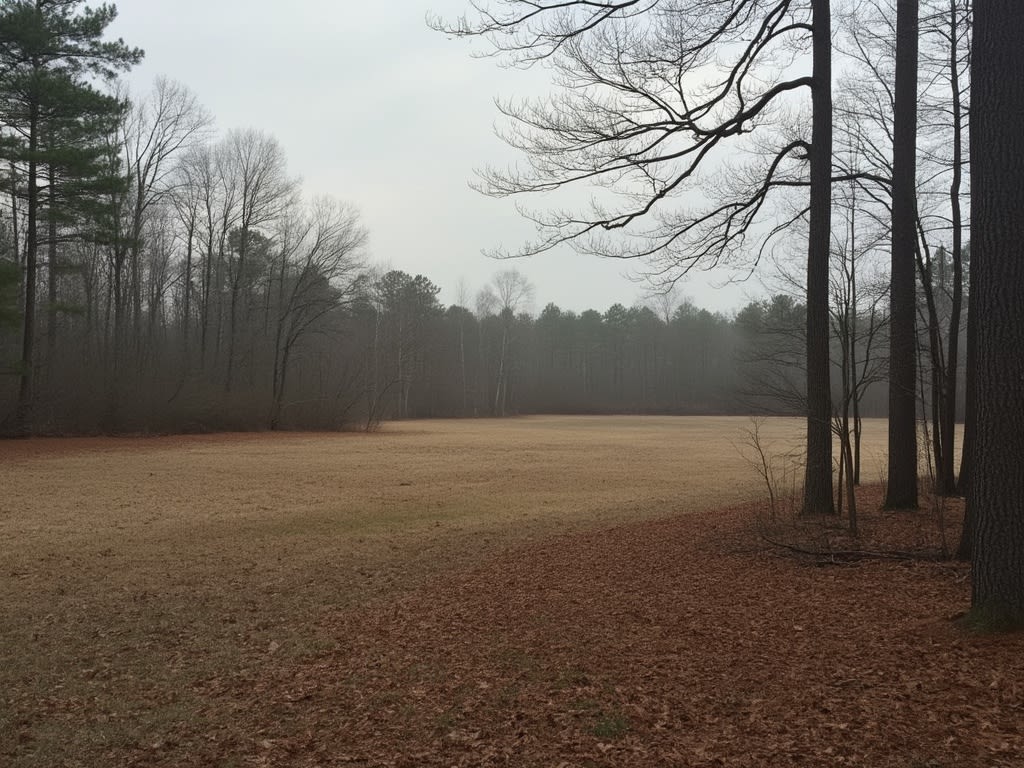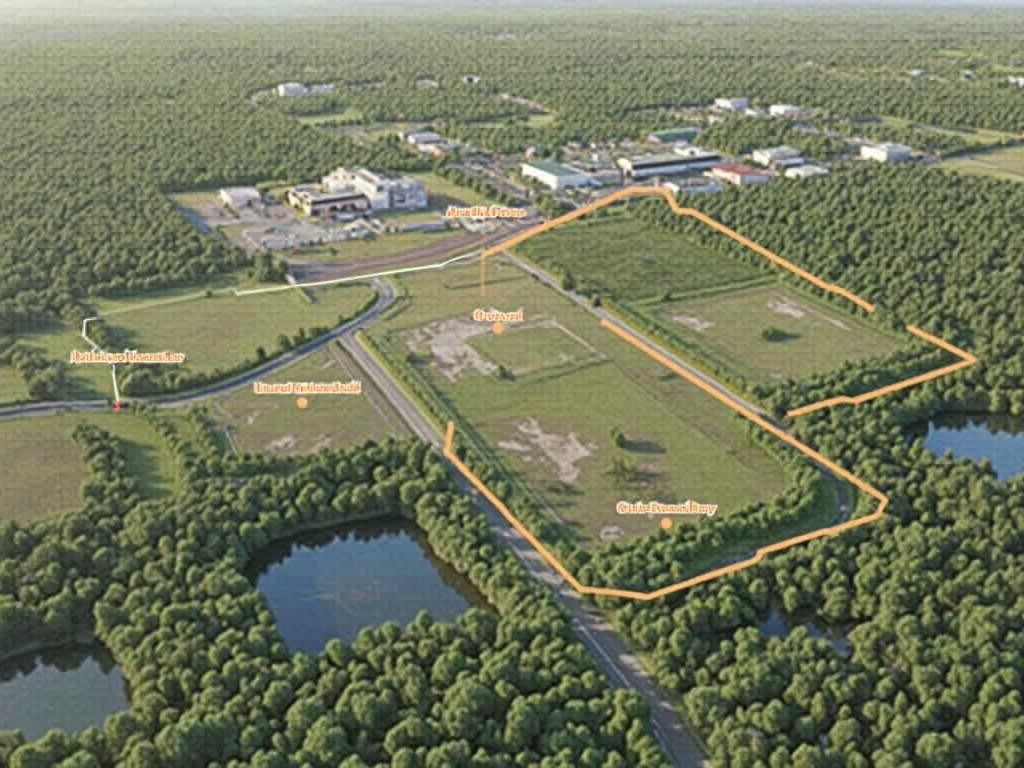Median prices rose 10.7% to $5,171 per acre in Georgia’s thriving land opportunities from 2021 to 2022. This growth stems from the state’s varied landscapes – from mountains to beaches – and positive economic trends. Buyers ranging from investors to farmers and retirees find Georgia appealing due to its reasonable land costs, beneficial tax policies, and extended growing seasons.
Key Takeaways:
- Basic unimproved land costs between $1,000-$1,500 per acre, while farmland with irrigation systems sells for $4,000-$5,000 per acre, making it accessible for multiple uses
- Tax benefits in Georgia restrict yearly property tax hikes and provide substantial advantages for retirees, including Social Security and pension exemptions
- Farmers benefit from the state’s favorable climate, offering 7-9 months of growing time and approximately 50 inches of yearly rainfall
- Prime development areas include the growing Atlanta suburbs, areas near Savannah’s port, and mountain communities like Ellijay and Blairsville
- Financial options through local community banks and Farm Credit offer specific lending packages for land acquisition, with varied financing choices based on property dimensions
Why Georgia’s Land Market is Booming: From Mountains to Coast
A State of Growth and Opportunity
Georgia’s land values continue to rise sharply, with Land.com reporting a 10.7% jump in median price per acre to $5,171 from 2021 to 2022. I’ve noticed this growth extends across the state’s varied terrains, from the Appalachian Mountains in the north to the serene coastal plains along the Atlantic.
Atlanta’s economic success has created ripple effects, pushing development and interest into nearby areas. Here are the key growth hotspots transforming Georgia’s most promising counties for land market:
- Savannah – Historic charm meets modern port expansion
- Athens – University influence driving residential demand
- Gainesville – Lake Lanier access attracting premium buyers
- Atlanta suburbs – Tech industry expansion creating new opportunities
The state offers unique geographic diversity, letting buyers choose between mountain retreats, rolling farmland, or coastal properties. This variety, combined with strong economic indicators, makes Georgia an attractive option for land investment.

Unbeatable Land Prices and Tax Benefits
Land Price Ranges
Georgia offers exceptional value for land buyers, with prices that fit various budgets and purposes. Raw unimproved land starts at just $1,000 to $1,500 per acre, making it perfect for long-term investment or future development. If you’re interested in farming, irrigated agricultural land runs between $4,000 and $5,000 per acre. Small residential tracts range from $2,000 to $10,000 per acre, depending on location and utilities.
Tax Advantages
Georgia’s tax structure makes land ownership particularly attractive. The state limits annual property tax increases by tying them to inflation rates, protecting owners from sudden spikes. Retirees benefit from significant tax breaks, including exemptions on Social Security income and pensions, making Georgia an ideal location for retirement property purchases.

Prime Locations and Investment Opportunities
Mountain Paradise in North Georgia
Georgia’s northern mountain region offers exceptional land buying opportunities. Ellijay stands out with its apple orchards and scenic mountain views, making it perfect for both residential and agricultural ventures. Blairsville’s pristine landscapes and Helen’s Bavarian-inspired charm create unique investment potential for vacation rentals and permanent homes.
Growth Zones and Emerging Markets
Atlanta’s expanding metro area continues to push property values higher across surrounding counties. Here are the key areas seeing substantial growth:
- Forsyth County, with its excellent schools and new commercial developments
- Cherokee County, offering larger land parcels at competitive prices
- Hall County, featuring lakefront properties and growing suburban communities
Small towns throughout Georgia have transformed into thriving communities. Places like Madison charm buyers with historic architecture, while Senoia attracts film industry attention. Coastal opportunities extend beyond traditional beachfront properties – I’ve seen strong returns in areas like Brunswick and St. Marys, where waterfront land meets small-town appeal.
The combination of established cities and emerging markets creates diverse investment options. Smart buyers can find everything from small residential lots to large acreage perfect for development or agriculture. What’s particularly appealing about Georgia’s land market is the mix of immediate use potential and long-term appreciation in these strategic locations.

Climate and Agricultural Advantages
Year-Round Growing Potential
Georgia’s mix of hot summers and mild winters creates perfect conditions for extended farming seasons. With temperatures rarely dropping below freezing, farmers can plant multiple crops throughout the year. The state’s climate supports a range of agricultural activities from traditional row crops to specialty produce.
Weather Patterns and Risks
I recommend careful consideration of weather-related factors before purchasing land. Here are key climate features to note:
- Average rainfall of 50 inches annually supports natural irrigation
- Growing season spans 7-9 months depending on location
- Risk of severe storms peaks during spring and early summer
- Coastal areas face hurricane threats between June and November
The climate’s benefits far outweigh potential risks for most agricultural ventures. Rich soil combined with consistent rainfall patterns makes Georgia land particularly valuable for farming operations. The state’s varied temperature zones also allow for diverse crop selection throughout different regions.

Financing and Development Considerations
Land Financing Options
Georgia offers several strong financing paths for land purchases. Local community banks excel at understanding rural property values and often provide personalized lending solutions. For tracts over 50 acres, Farm Credit stands out as a specialized lender, typically offering competitive rates and longer terms suited to agricultural and recreational uses.
Development Costs and Infrastructure
Building costs can shift dramatically based on your land’s location and features. Here’s what impacts your development budget the most:
- Slope and soil composition – steeper terrain requires additional site preparation
- Distance to utilities – remote locations may need wells and septic systems
- Road access – private drives need regular maintenance and initial construction
- Tree clearing requirements – heavily wooded lots increase preparation costs
Rural areas might lack immediate access to public water and power, but Georgia’s infrastructure continues to expand into previously remote regions. I recommend checking with county offices about planned utility expansions before purchasing. Local utility companies can provide cost estimates for extending services to your property, which helps create an accurate development budget.
Georgia’s varied landscape means construction costs differ between regions. Mountain properties often need specialized foundations, while south Georgia’s flat terrain typically allows for simpler building methods. Building costs currently average $150-200 per square foot, though this varies by county and construction type.
Lifestyle and Community Benefits
Small-Town Charm Meets Modern Living
Southern hospitality remains a cornerstone of Georgia’s appeal. I’ve found that local communities embrace newcomers with open arms, making the transition into rural or suburban life smooth and enjoyable. The state’s relaxed pace creates perfect conditions for both families and retirees looking to escape busy city environments.
Here’s what makes Georgia’s community life special:
- Regular community events and festivals that bring neighbors together
- Active local chambers of commerce supporting small businesses
- Strong church and civic organizations fostering social connections
- Farm-to-table initiatives connecting residents with local agriculture
- Diverse recreational programs for all age groups
Georgia’s expanding economy supports this lifestyle, with growth in technology, manufacturing, and agriculture sectors. Each county offers distinct zoning options, letting you pick a location that matches your ideal way of life – from hobby farming to residential development. If you’re planning to sell your Georgia land in the future, these community factors can significantly increase your property’s value.


